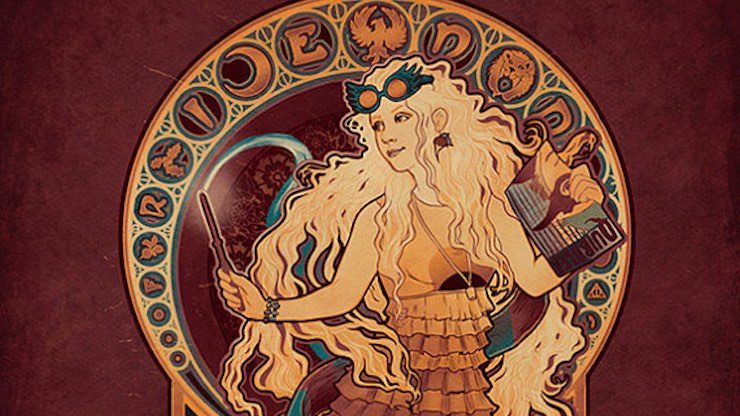Cynicism is tempting. It hovers constantly at the edge of every hopeful moment, whispering “it will never happen.” It looks intelligent. It looks wry and elegant and worldly.
And it has never managed to ensnare Luna Lovegood.
Luna has spent years being told to give up. She has spent years being told that if she doesn’t give up, she’ll be left alone, barefoot and reviled. She has spent years among the Ravenclaws, being treated as stupid because she will not bend to cynicism.
She is precisely what the rebellion needs.
Luna joins Dumbledore’s Army because she believes. She believes that Voldemort has returned, because she believes people who tell her they’re in danger. Because her friend bears a scar.
She believes that an army must rise up to fight The Dark Lord. She believes that he can be defeated.
She believes that she can be a part of that fight.
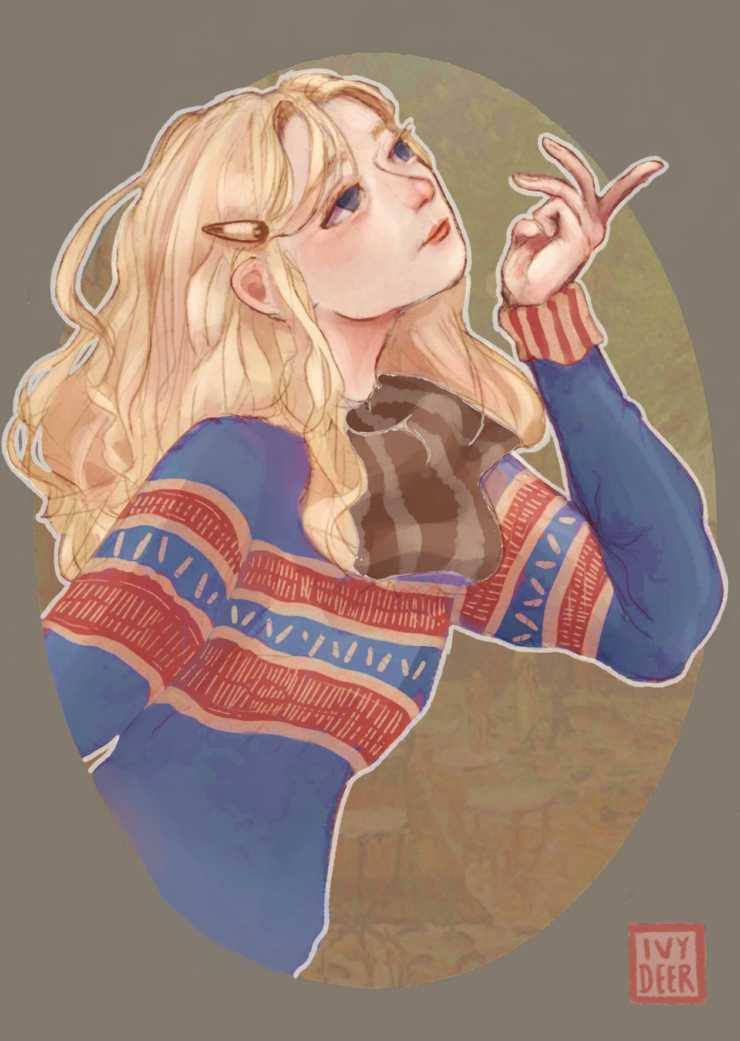
If anyone is entitled to cynicism, it’s Luna.
She watched her mother die when she was just nine years old. That’s old enough to remember every second of her mother’s death. More than Harry Potter ever remembered of his mother’s death, at least on his own—more than a green flash and a scream.
She saw the whole thing, and it would be a mercy if she managed to forget an instant of it.
But if there’s anything that is true about Luna, it’s this: she doesn’t forget.
She doesn’t let go.
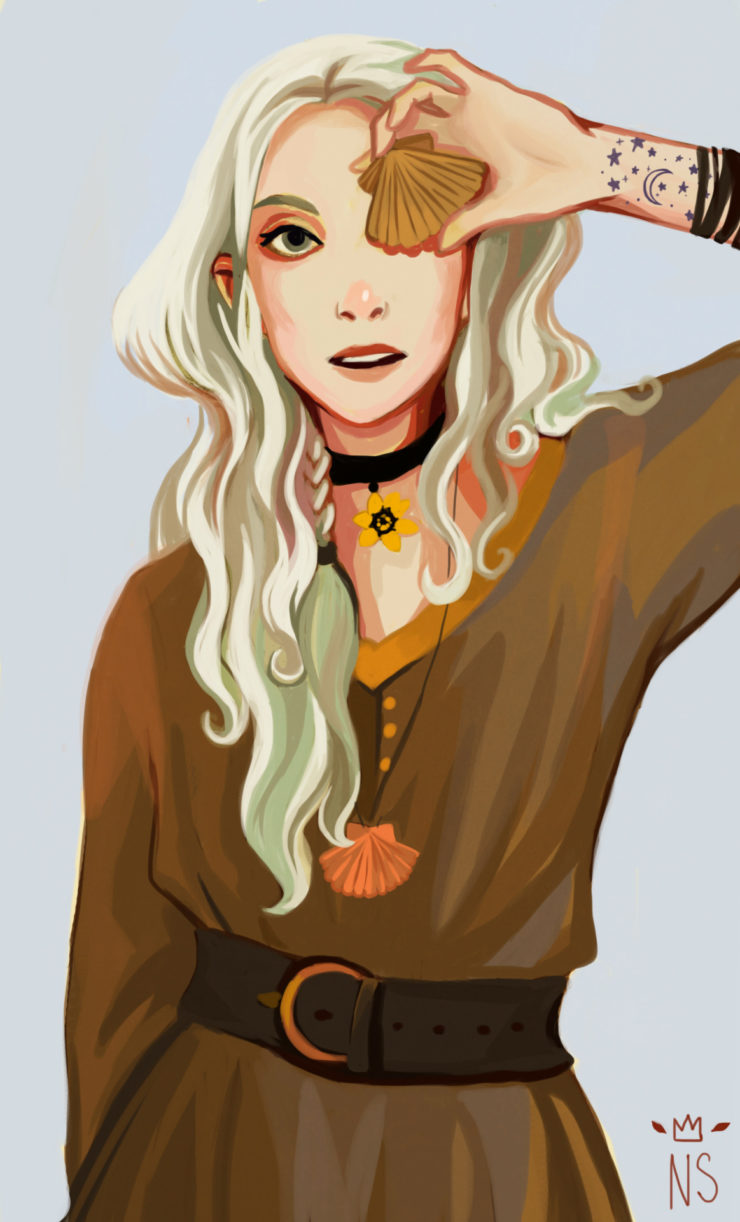
By all rights, Luna should be a bone-deep misanthrope. It’s all anyone seems to want her to be. Her dogged belief in things beyond scholarly understanding paints a target on her back, and throughout her childhood, she’s bullied for her relentless optimism. She doesn’t just insist on believing in things she cannot see—it’s far worse than that.
She insists on believing in herself.
It’s not that Luna is oblivious. It’s not that she doesn’t know about the nicknames. When her shoes are stolen and her possessions scattered every year, she knows she’s being bullied. She knows she’s not cool. She knows that people don’t respect her.
But she respects herself anyway.
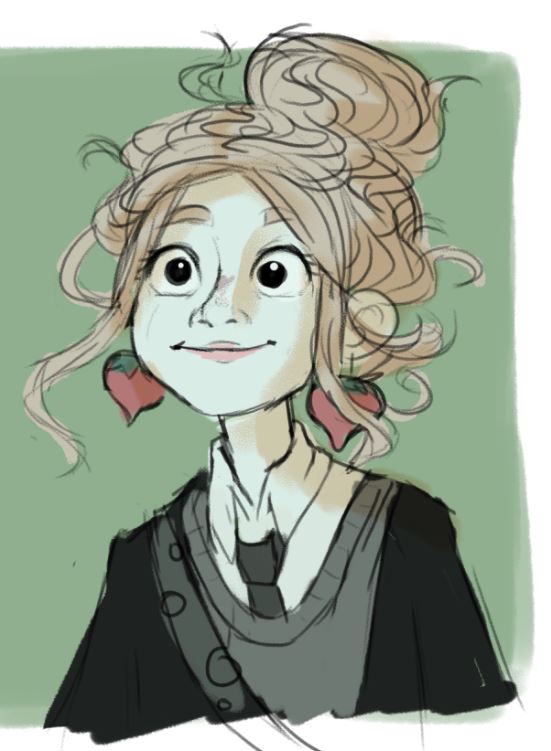
How does she do it? How does Luna resist the tidal pull of popular opinion? She’s described as having her head in the clouds so often that it’s easy to forget how incredibly grounded she is. Her roots run deeper than those of her classmates—she’s grounded in belief, unwavering and unmitigated by the scorn of her peers. How?
It’s easy to speculate. Perhaps it’s because she’s anchored to tragedy, or perhaps it’s because she’s been drawn in by the strong will and fervent mind of her father. He believes in the unbelievable, and without another parent there to guide her, Luna might easily glide along in his wake, none the wiser.
But there is another possibility.
Perhaps it’s because Luna has already seen that which others refuse to see. She’s seen death and tragedy when she was young enough to think that those twin shadows would have missed her. She’s seen the way loneliness and loss can destroy a man like her father, and she’s seen the way love can sustain him. She’s seen the thestrals—only visible to her because of the horror that has touched her life—invisible to her more fortunate classmates, further proof to them of her otherness.
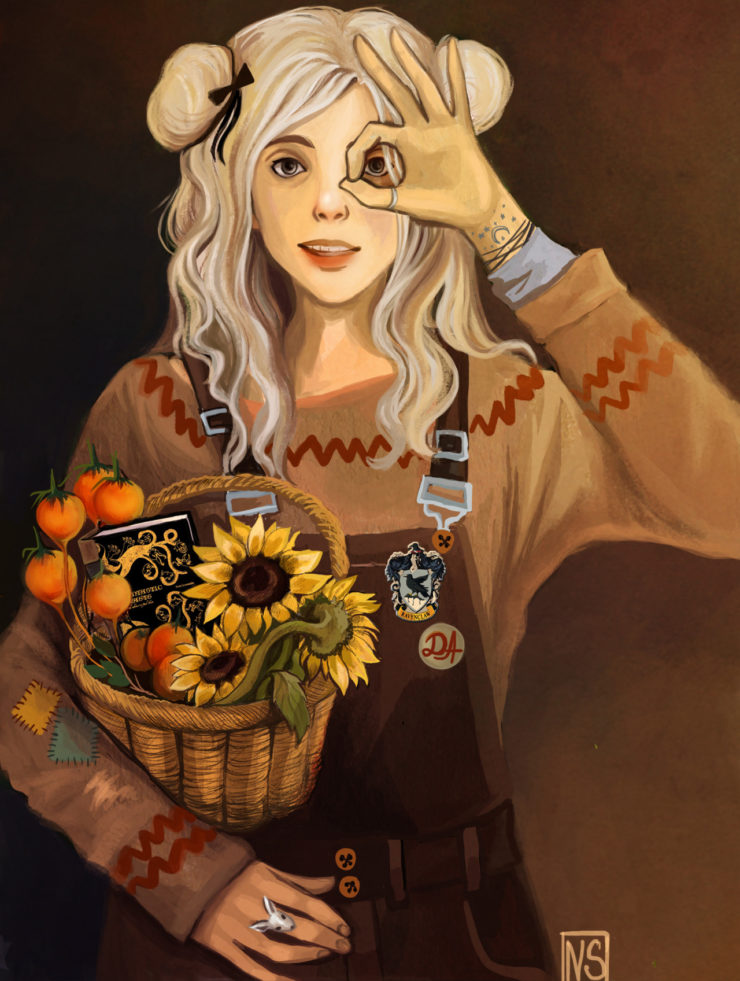
Luna Lovegood has seen more than most of the deepest-dyed cynics in the Hogwarts student body could begin to imagine.
Why should she believe that what she’s seen so far is all there is to see?
Luna doesn’t fear darkness, because she has stood in the shadow of death itself.
She doesn’t fear darkness, because she believes that there is more than darkness in the world.
So she fights.
She fights to protect the boundless possibility she believes in. She who has been called a fool for believing—she draws on her belief, pulls courage and tenacity and brass-necked audacity from it. She joins Dumbledore’s Army. She distributes counter-propaganda material, even when the punishment for doing so is torture at the hands of Dolores Umbridge. She fights the Inquisitorial Squad. She fights Death Eaters at the Department of Mysteries, and she watches Sirius die, and she’s one of the last soldiers there to fall to the enemy. She fights in the battle of the Astronomy Tower, and watches Dumbledore die. More death, always death, and still she fights.
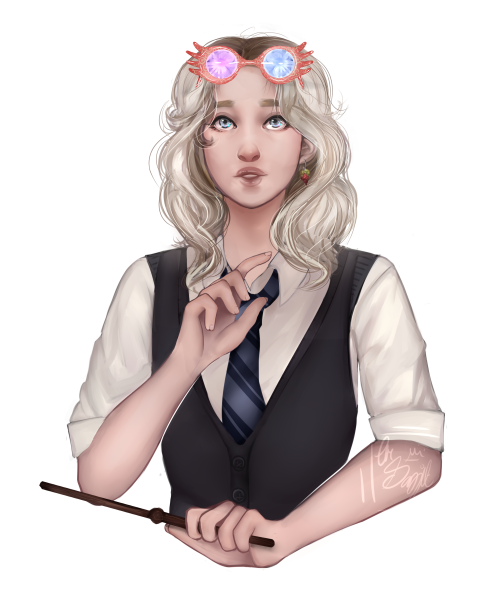
In her sixth year at Hogwarts, she resurrects the resistance under the nose of an enemy administration. She gets found out, but she doesn’t let that stop her. And she doesn’t get away with it.
She’s captured. She witnesses the brutal torture of her fellow prisoners, and is almost certainly tortured herself. She comforts those who are imprisoned beside her, giving them the strength to continue living in that place of fear and pain.
When she finally escapes and is taken to safety, she would be well within her rights to remain protected until the end of the war. But through all of that—all of the fighting and the secrets and the terror and the torture—Luna doesn’t give in. She doesn’t allow the darkness to eat at her soul and leave her afraid.

So when the Golden Trio return to Hogwarts for the final battle, and Neville Longbottom sends Luna the signal that the ultimate battle against that all-devouring darkness is about to begin, she doesn’t hesitate.
She takes up arms one last time, and she joins the fight.
Luna fights the darkness tooth and nail.
She is fearless in the face of Bellatrix LeStrange—sadist, torturer, murderess. She stands beside Ginny Weasley and Hermione Granger and fights that woman with a ferocity that can only be fed by unwavering certainty.
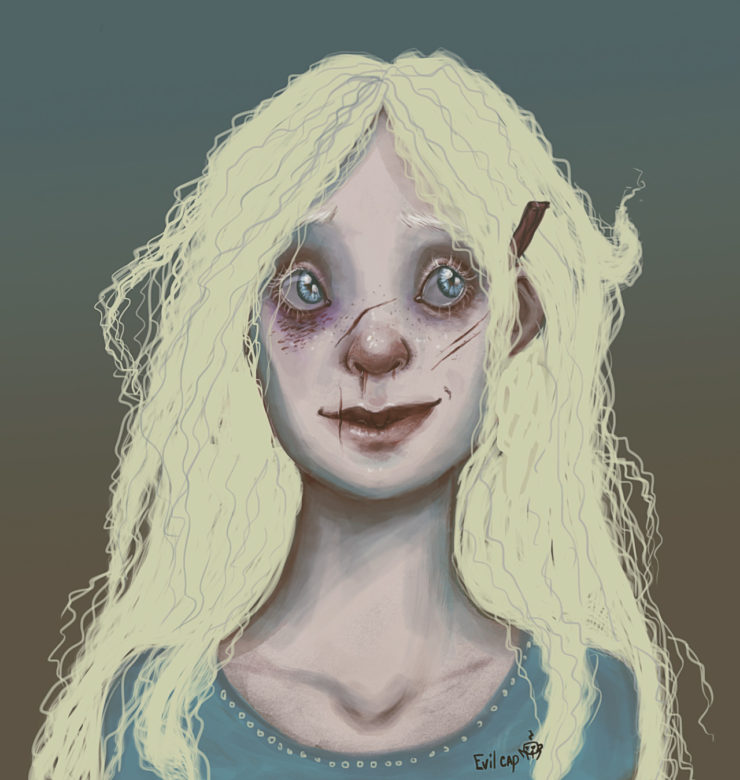
She fights, because she believes that there are things worth fighting for.
She fights, because she’s fought before and survived worse than this.
She fights, because everyone has always told her she can’t.
She fights because she doesn’t believe them.
Luna Lovegood could have given up her optimism a thousand times. Should have given it up, many would argue. Luna saw loss, saw sorrow, saw solitude and pain. She stood witness to the way death can arrive at random, without warning—and she stood witness to the ways people visit death upon each other.
She has seen blood and heard screaming. She has seen the consequences of the fight she refuses to give up.
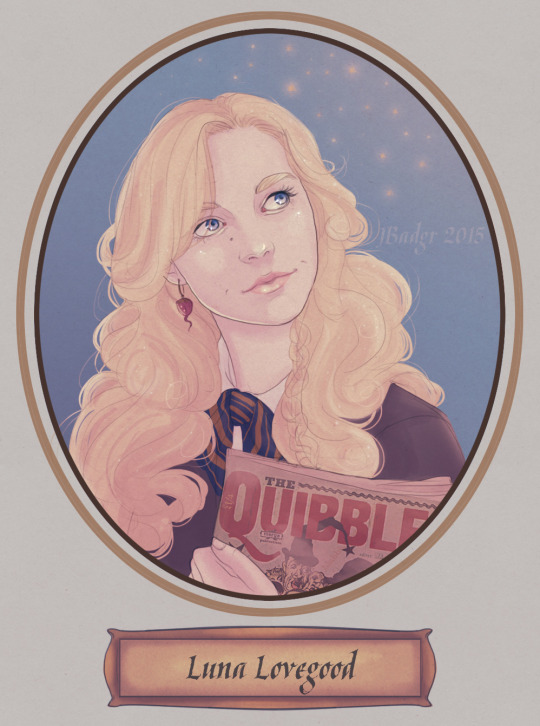
Luna Lovegood has every right to be a cynic.
She sees it. She knows it. She tells people about the loss she’s suffered, and she doesn’t hide her sorrow. But she refuses, time and again, to discard her sense of hope and wonder. Her eyes are wide open, and her fist is forever raised against tyranny, because she knows in her heart that there is more to her world than what lies in the shadows. Whatever there is to discover, she will never stop fighting for it.
She will never surrender her hope.
Top image by Megan Lara.
Sarah Gailey’s fiction has appeared in Mothership Zeta and Fireside Fiction; her nonfiction has been published by Mashable and Fantasy Literature Magazine. You can see pictures of her puppy and get updates on her work by clicking here. She tweets @gaileyfrey. Watch for her debut novella, River of Teeth, from Tor.com in 2017.










